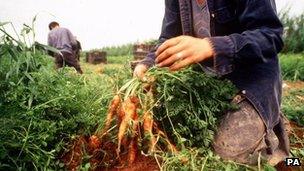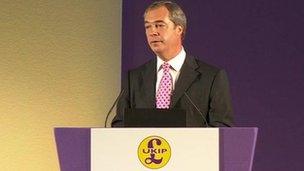New year new life in the country for migrant workers?
- Published
- comments
Eric Pickles says he doesn't know.

Thousands of East Europeans come to work on British farms each year
And Jack Straw doesn't know either.
But he admits the Labour government, in which he served as home and foreign secretary, got it wrong by not imposing extra controls when EU expansion triggered the arrival here of migrant workers from eastern Europe.
The one leading politician who says he does know is the UKIP Leader Nigel Farage.
"If you open your doors to people from countries with significantly lower wages and GDP than the UK then migratory flows will come," he said.
In just over a month's time, restrictions on the number of Romanian and Bulgarian workers coming to the UK will be lifted.
From some sections of the press have come apocalyptic warnings that millions more migrant workers are about to flood into the Midlands labour market and add further to the pressure on public services including schools and health.
So what will be the impact?
Communities Secretary Eric Pickles is one of a procession of cabinet ministers who have declined repeated opportunities to answer this question.
They say, that if you cannot give estimates that are reliable then it is better not to give any at all.
When I chaired a BBC conference earlier this year, attended by representatives of the Bulgarian and Romanian embassies here, they were dismissive of what they clearly saw as alarmist speculation.
Not only, they said, were millions of their low-paid workers emphatically not preparing to head to Britain, those relatively modest numbers who were considering it were likely to be top professionals like medics who would be assets rather than liabilities.
But from the perhaps unexpected quarter of the centre-left research organisation Demos, came a distinct note of caution: "Large and sudden arrivals can lead to extreme concentrations of migrant communities.

UKIP leader Nigel Farage has warned of 'migratory flows' from parts of Europe
"People from Bulgaria and Romania, arriving en masse, will naturally congregate in places where there is unskilled flexible work available and where friends and relatives may be already."
On Sunday Politics Midlands this week we will be reporting from Herefordshire where the number of migrant workers has more than doubled over the past decade.
Most of them are seasonal, of course, summer crop picking and the like. But remaining migrants are continuing to work even in the freezing gloom of November while others are tidying up and preparing for next year's harvests.
Most of them came here under the Seasonal Agriculture Workers Scheme which imposes strict limits on their employment here.
But from the new year, these restrictions will be lifted.
'Plans off course?'
Hence all those warnings, including Mr Farage's vision of "migratory flows".
If he is right, it would threaten what the Conservatives' hope will be one of their big themes in the 2015 general election campaign.
How could they claim to have reversed the trend under the Labour years if Bulgarian and Romanian migrants were driving all their deep-layed plans off course?
Net migration is currently running at 150,00 a year and the campaigning organisation Migrationwatch UK estimate this new influx could push that figure up to 200,000.
This, they say, would further aggravate the already serious shortage of school places and require a new house to be built every seven minutes for 20 years to cope with the demand.
Alp Mehmet, from Migrationwatch UK, will be among my studio guests this week. So too will the only Labour MP to say Britain's exit from the EU is "inevitable", Gisela Stuart, MP for Birmingham Edgbaston. Also with me, Phil Bennion, the West Midlands Liberal Democrat MEP, determined to defend Britain's place in the EU and his own seat in its Parliament in next year's European elections.
And I hope you will join me too from 11:00 GMT on BBC One in the West Midlands.